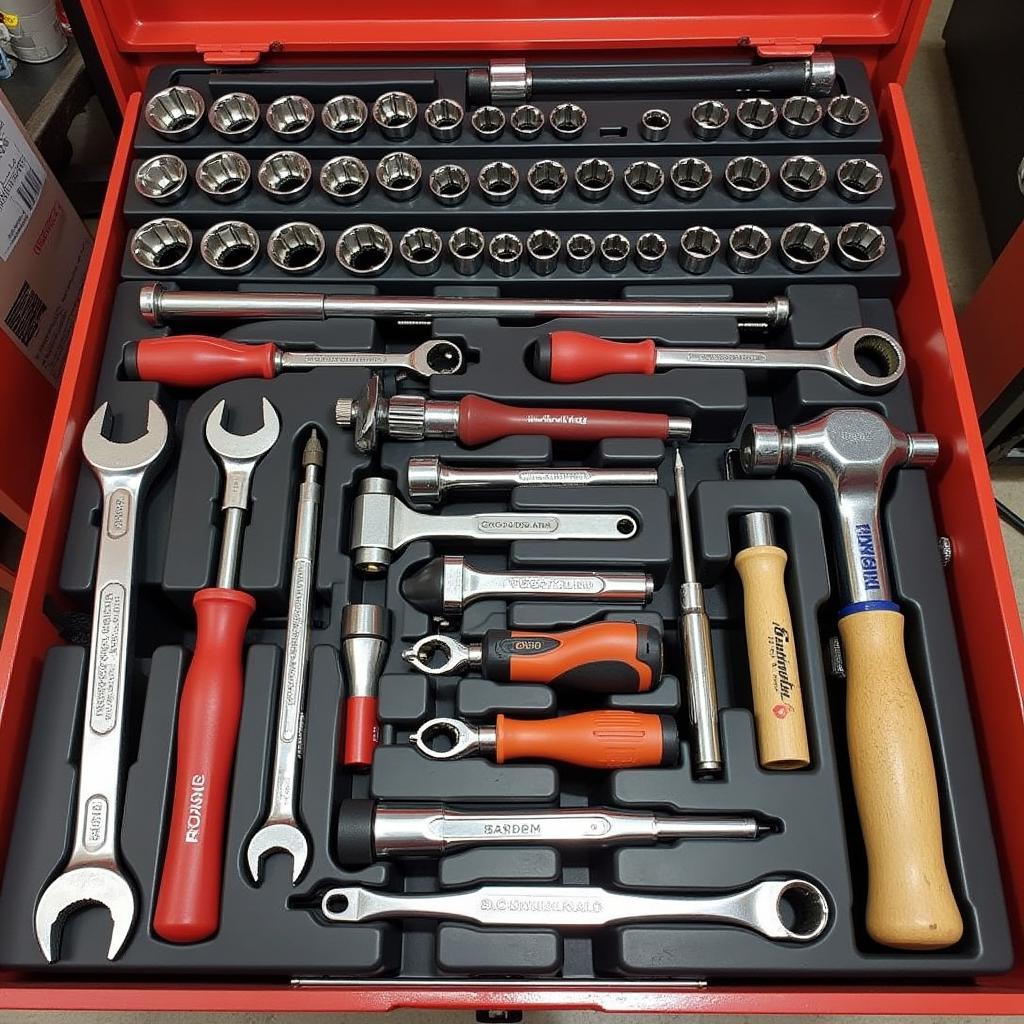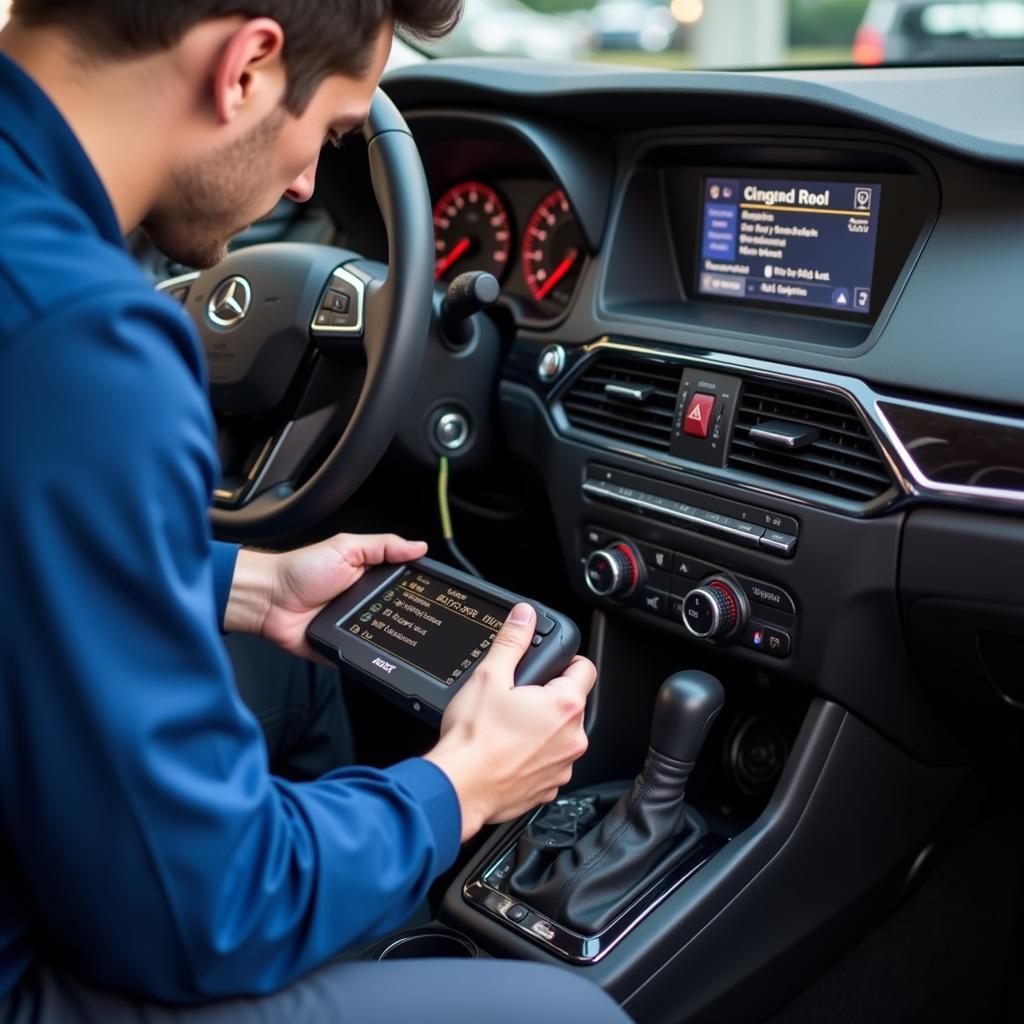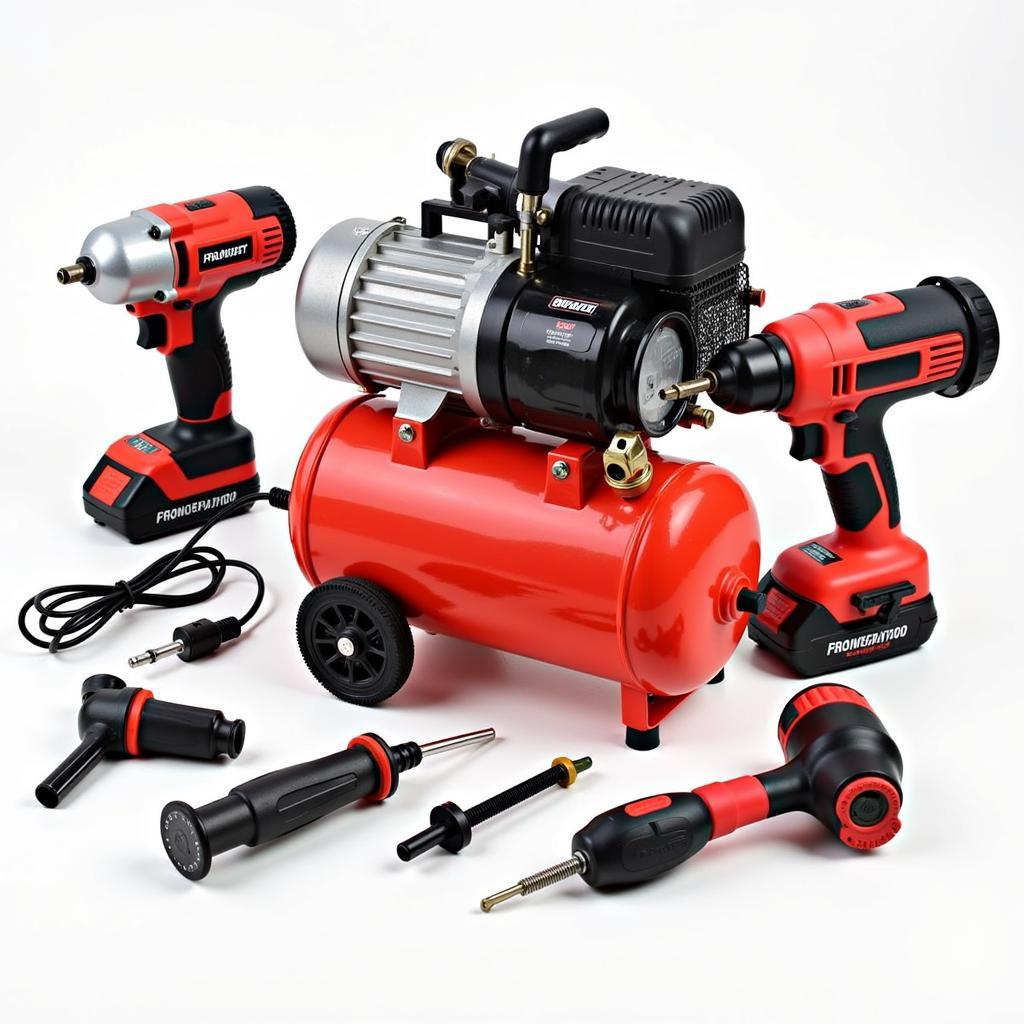Car Mechanics Tools are the backbone of any successful automotive repair shop or DIY enthusiast’s garage. From simple hand tools to complex diagnostic equipment, having the right tools for the job is crucial for efficient and accurate repairs. This guide will explore the essential car mechanics tools, categorizing them by function and highlighting their importance in the automotive world. We’ll cover everything from the basics to specialized equipment, helping you navigate the world of car maintenance and repair. Check out our comprehensive car mechanics tools list for a detailed breakdown of necessary tools.
Hand Tools: The Foundation of Every Mechanic’s Arsenal
Every mechanic, whether professional or amateur, starts with a core set of hand tools. These are the workhorses of any repair, providing the fundamental means to dismantle, adjust, and reassemble vehicle components. These tools are vital for tasks ranging from simple oil changes to complex engine overhauls.
- Wrenches: Wrenches are indispensable for tightening and loosening nuts and bolts. A good set should include both metric and standard sizes, in various lengths and styles, including combination wrenches, open-end wrenches, and ratcheting wrenches.
- Screwdrivers: Screwdrivers are essential for removing and installing screws. A variety of sizes and types, including Phillips, flathead, and Torx, are necessary to accommodate the different screw types found in vehicles.
- Pliers: Pliers offer gripping, cutting, and bending capabilities, making them invaluable for tasks like removing clips, holding wires, and manipulating small parts. Different types of pliers, such as slip-joint, needle-nose, and locking pliers, offer specific advantages for various tasks.
- Sockets and Ratchets: Sockets and ratchets provide leverage and speed for removing and installing nuts and bolts, especially in tight spaces. Investing in a comprehensive socket set with various sizes and drive sizes is essential.
- Hammers: Hammers are used for striking and driving parts, such as removing stuck components or installing bearings. Different types of hammers, including ball-peen, sledge, and dead-blow hammers, are suited for specific applications.
 Essential Hand Tools for Car Mechanics
Essential Hand Tools for Car Mechanics
Diagnostic Tools: Unveiling the Mysteries of Modern Vehicles
Modern vehicles rely heavily on complex electronic systems. Diagnostic tools allow mechanics to communicate with these systems, identify problems, and perform necessary repairs. These tools can range from simple code readers to advanced scan tools capable of in-depth analysis.
- Code Readers: Code readers retrieve diagnostic trouble codes (DTCs) from the vehicle’s onboard computer, providing clues to potential problems.
- Scan Tools: Scan tools offer more advanced functionality than code readers, allowing mechanics to view live data streams, perform actuator tests, and access more detailed diagnostic information.
- Multimeters: Multimeters measure voltage, current, and resistance, helping diagnose electrical issues in the vehicle’s various systems.
 Diagnostic Tools for Modern Vehicles
Diagnostic Tools for Modern Vehicles
Specialized Tools: Addressing Specific Repair Needs
Certain repairs require specialized tools designed for specific tasks. These tools can range from simple alignment tools to complex engine rebuilding equipment. You can find some cheap car tools to start with.
- Brake Bleeders: Brake bleeders are used to remove air from the brake lines, ensuring proper brake function.
- Fuel Pressure Testers: Fuel pressure testers measure the fuel system’s pressure, helping diagnose fuel delivery problems.
- Compression Testers: Compression testers measure the pressure in the engine’s cylinders, providing insights into engine health and performance.
“Having the right specialized tools can save you significant time and frustration,” advises John Smith, a seasoned automotive technician with over 20 years of experience. “Investing in quality tools, even if you’re a DIYer, is a worthwhile investment.”
Power Tools: Amplifying Efficiency in the Garage
Power tools significantly increase efficiency in the automotive repair process, making complex tasks easier and faster. From impact wrenches to air compressors, these tools are essential for professional mechanics and serious DIYers alike.
- Impact Wrenches: Impact wrenches quickly remove and install lug nuts and other fasteners, reducing the time and effort required for these tasks. Find out more about do car mechanics have to buy their own tools.
- Air Compressors: Air compressors power various pneumatic tools, including impact wrenches, air ratchets, and paint sprayers.
 Power Tools for Car Mechanics
Power Tools for Car Mechanics
Conclusion: Choosing the Right Car Mechanics Tools
Choosing the right car mechanics tools is crucial for efficient and effective repairs, whether you’re a professional mechanic or a DIY enthusiast. Investing in quality tools, both hand tools and specialized equipment, will pay off in the long run, saving you time, frustration, and potentially money. Understanding the function and purpose of each tool will help you make informed decisions and build a well-equipped toolbox tailored to your specific needs. Remember, having the right tools is only half the battle; knowing how to use them correctly is equally important. For those interested in specific brands or specialized tools, take a look at our review on Snap-on tools RC car or explore our selection of kids play tools car.
FAQ
- What are the most basic car mechanic tools?
- Wrenches, screwdrivers, pliers, and a socket set are essential starting points.
- What diagnostic tools do I need for modern cars?
- A code reader or scan tool is crucial for diagnosing electronic issues.
- What are some specialized tools for brake repairs?
- Brake bleeders and line wrenches are essential for brake work.
- What is the importance of having the right car mechanics tools?
- Using the correct tools ensures efficient, accurate, and safe repairs.
- Where can I find a comprehensive list of car mechanics tools?
- DiagFixPro offers detailed guides and lists of essential tools.
- Are power tools necessary for DIY car repair?
- While not strictly necessary, they can significantly speed up certain tasks.
- What are some common mistakes to avoid when using car mechanics tools?
- Using the wrong tool for the job can damage components and create safety hazards.
For further assistance, please contact us via WhatsApp: +1(641)206-8880, Email: [email protected] or visit our office at 910 Cedar Lane, Chicago, IL 60605, USA. Our customer service team is available 24/7.

Leave a Reply